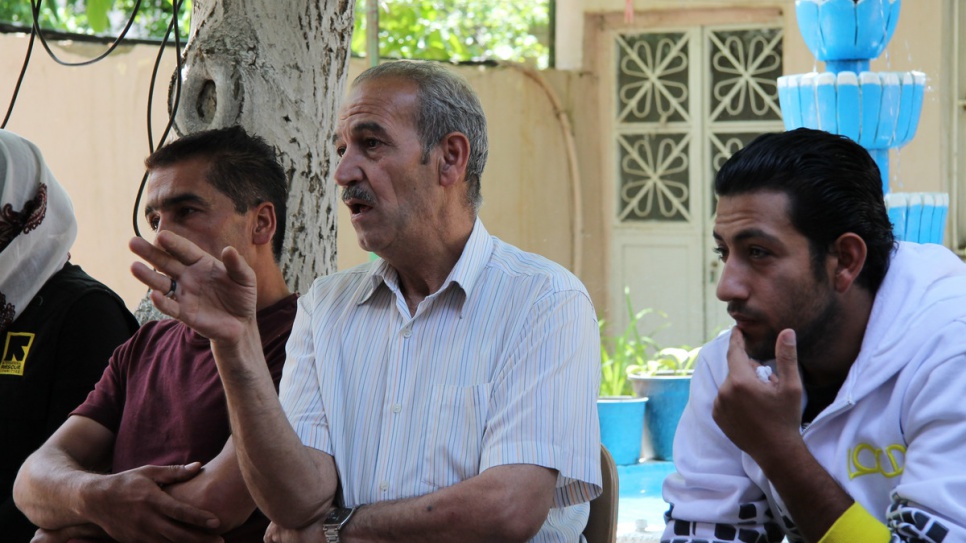Schools enrol more Syrian refugee children in Lebanon
UNHCR is working with its partners in Lebanon to expand educational opportunities for thousands of young refugee from neighbouring Syria.

Mahmoud, a refugee and father from Syria, shares his hopes and concerns about his children's education at a meeting led by UNHCR and the International Rescue Committee in Baalbek, Lebanon. © UNHCR/Matthew Saltmarsh
BAALBEK, Lebanon – A father of eight, Mahmoud fled the war in Syria four years ago, shepherding most of his family to safety in Lebanon. Since then, his children’s education has been patchy. Some have missed years of schooling.
“My dream is that they have a brilliant future, better than now,” he says, on the sidelines of an outreach meeting for the parents of refugee children facilitated by UNHCR in this town in eastern Lebanon.
“Maybe one can still become an architect, another a doctor,” he adds. “I want the best for them in society and in life. To have a position in life, education is very important.”
The UN Refugee Agency, the Government of Lebanon and other partners like UNICEF are working with refugees like Mahmoud to make that happen by improving educational opportunities for children among the more than 1 million Syrian refugees in Lebanon.
In 2012, the Ministry of Education and Higher Education, or MEHE, opened the doors of public schools to refugee students, giving them a chance at an education. It subsequently added a second shift to enable more children to attend.
There have been positives. A recent report, “UNHCR Lebanon: Back to School,” shows that 157,984 refugee children – from Kindergarten to grade nine – were enrolled in formal public education in January, up from 106,735 a year earlier and 62,664 in 2013–2014.
More ambitious targets are being set for the next academic year through the national education strategy currently being developed, which aims to enrol all children in Lebanon. The number of schools offering the second shift grew to 238 in 2015–2016, up from 144 a year earlier and 90 in 2013–2014.
Another UNHCR contribution to education here is its outreach capacity and ability to mobilize communities around enrolment and retention. UNHCR assists learning through more than 100 refugees trained to act as “education mobilizers” in their own communities.
They help establish parents’ committees to galvanize the enrolment of refugee children in public schools and support students with their homework from informal settlements or shared apartments. It also supports group sessions that have a more social or psychological aim, like the one in Baalbek.
Still, the sector faces challenges. Many schools report that attendance often falls short of enrolment figures due to the movement of refuges families, the high cost of transportation or stationery, distances involved and students’ difficulties adapting to a new system.
Some families also need their children to work to make ends meet, as the vulnerability and indebtedness of refugees rises across the country. And some Syrian kids have struggled with the linguistic demands of the Lebanese curriculum, where some classes are taught in English or French.
To counter this, the government and partners have introduced so-called accelerated learning programmes to help children who have missed months or years of learning make up lost time.
A separate UN interagency report conducted with MEHE estimated that 255,400 children of all nationalities were out of school in Lebanon at the end of last year. It recommended further outreach efforts and more funding for MEHE to expand classes.
"One day, I’d like the kids to finish their education in Syria.”
At a recent meeting in Qsarnaba, also in the Bekaa Valley, refugees gathered in a tent under a baking sun for a community meeting to discuss ways to stop children from dropping out of school and working. Volunteer counsellors repeatedly stressed the importance of gaining a certificate from a Lebanese school that is transferrable in future.
Ahmed*, a refugee from Raqqa, recounted the difficulties – mainly financial – that he had encountered keeping his two children, 9 and 12, in school for a long period. He said he would like to register them in public school but had missed enrolment for the current year. “For now, I help them with what I can,” he said. “What I know, I teach.”
“I’ve seen my neighbour’s children are improving in public school,” he added. “I’ll be happy if they learn in the same place and then, one day, I’d like the kids to finish their education in Syria.”
Back in Baalbek, Amira*, a volunteer in her 40s, told the group how her son had seen “something horrible” amid the fighting in Syria, when he was just three years old. “He speaks,” she told the meeting, “but not like a normal child.”
She is awaiting resettlement abroad, hoping for a new start and the possibility of more specialised help for her son, to bring him out of his shell.
*Names changed to protect identities
